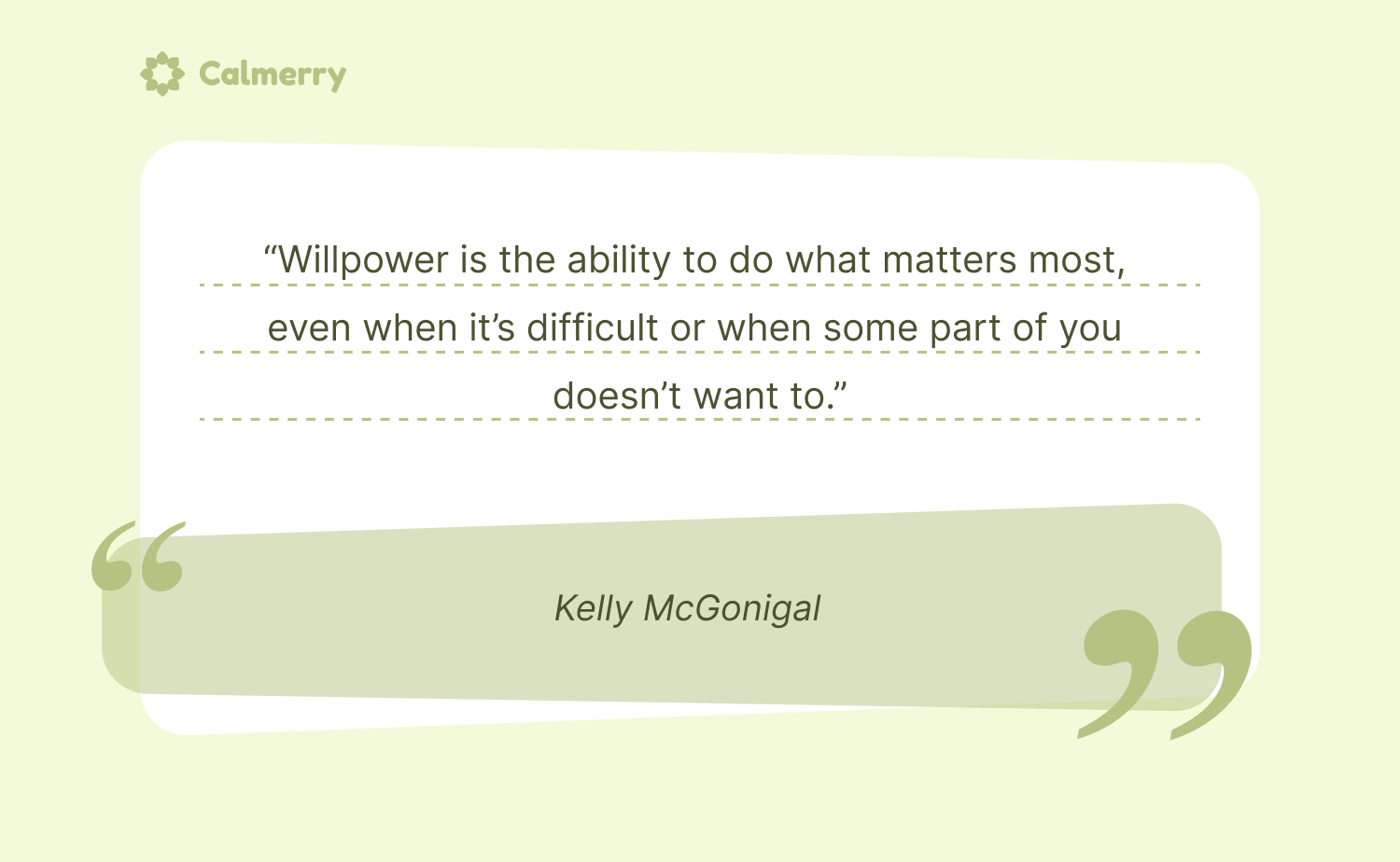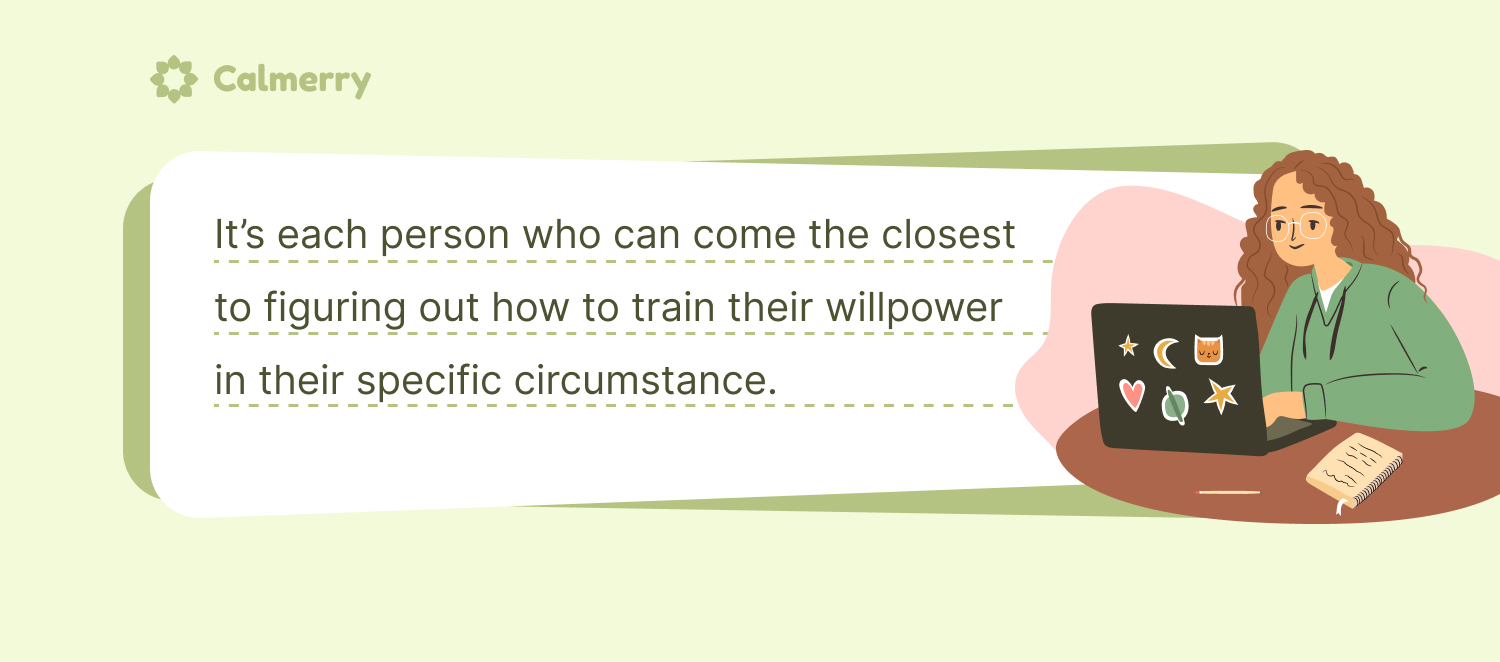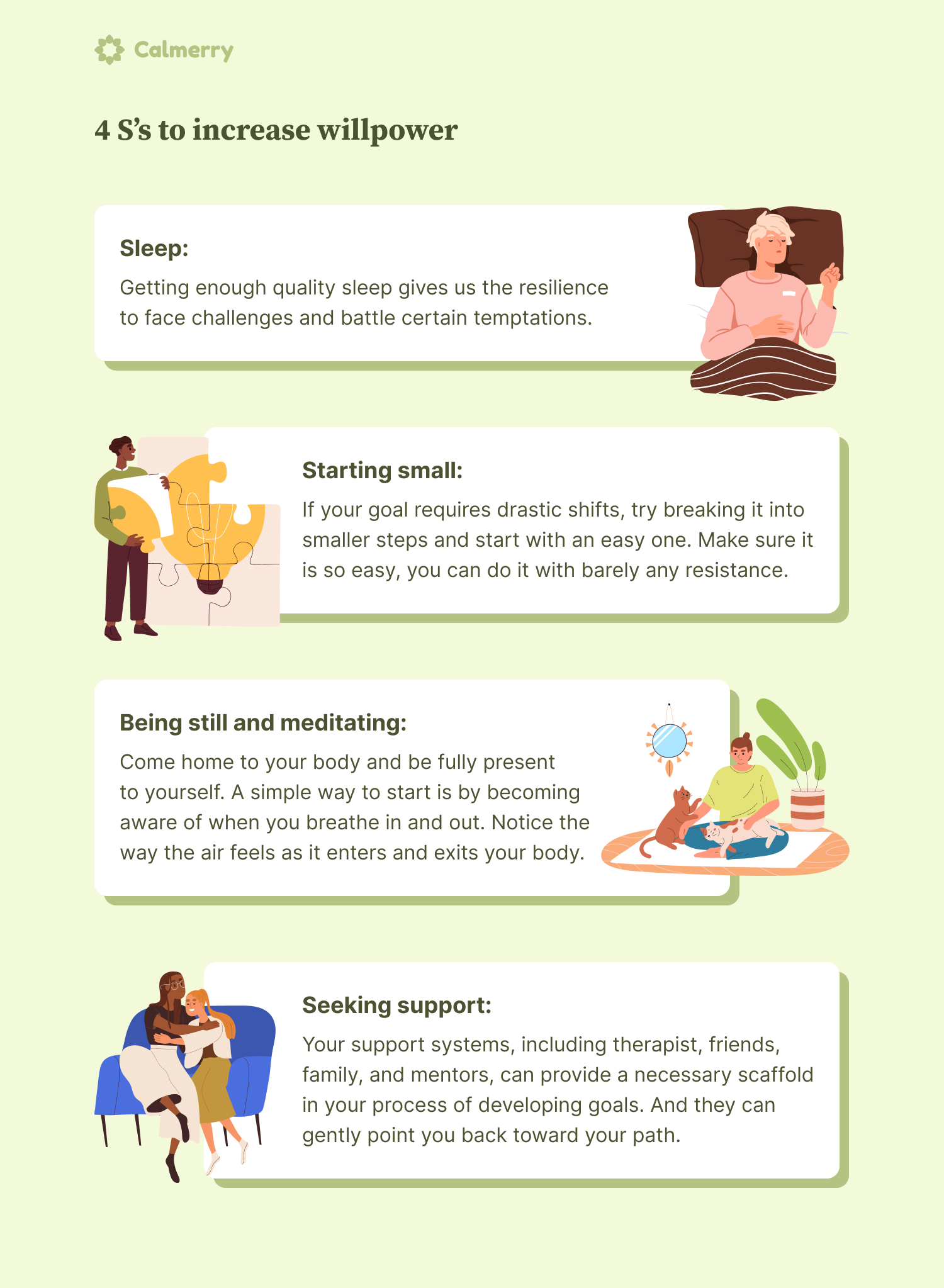What Is Willpower? Try These 4 S’s to Increase It and Reach Your Goals

In this article
I don’t know about you, but I have definitely hit the snooze button and passed up on morning exercise after vowing the night before that I would get up early and get moving. It’s still dark. I need more sleep. I’ll do it tomorrow…
There is a pervasive idea that we can improve our lives with the golden ticket of willpower. But how much control do we really have over ourselves? It’s an age-old question without a definitive answer.
So, what is willpower, exactly?
Let’s start by understanding exactly what the term willpower refers to. Stanford University psychologist, Kelly McGonigal, defines willpower as “the ability to do what matters most, even when it’s difficult or when some part of you doesn’t want to.”
This means that in the battle of minimal stress right now versus minimal stress over the long haul, the latter must take the trophy.

Does a lack of willpower affect your ability to succeed?
There is conflicting research on how important willpower is for our success in life and how much control we actually have over it.
Some people say that it is like a muscle: the more we use it, the stronger it gets. They would tell me that each time I get out of bed, when I feel like continuing to snooze, I am building my willpower muscle.
Others say that, like the strength of a muscle, we have a limited amount of willpower and should focus more on avoiding scenarios where we need to use it. For example, they might tell me to place my alarm clock across the room-rendering the reach-and-snooze impossible whether I’m tempted to do that at the moment or not.
And many have questioned the entire concept of boosting your willpower, finding that willpower is not like a muscle, does not get depleted, can potentially only be boosted in the short term, or will fluctuate depending on how you perceive it.
Is there a secret to building strong willpower?
Yet, a few things on the subject are clear. For one, there is some link between a person’s belief in their capacity for self-control and their quality of life – including how well they do in school, how happy they are, and how healthily they eat.
And perhaps more importantly, there is no link between a person’s willpower and their moral value or strength of character.
It’s each person who can come the closest to figuring out how to train their willpower in their specific circumstance.

There are many complex factors that influence human behavior, including:
- Our socioeconomic status
- Biology
- Life history
- And the stressors that we face in our day-to-day lives
The truth is, no scientist or researcher can say for sure whether or when someone can wield their inner force towards achieving their long-term goals.
In reality, it’s each person who can come the closest to figuring out how to train their willpower in their specific circumstance. And it will likely change day-to-day and moment-to-moment.
Increase your willpower to reach your goals with these 4 S’s
This doesn’t, however, mean that we are powerless or that we should give up trying to reach our objectives completely. There are several things that we can do to set ourselves up for success.
Below are four tried-and-true practices to increase willpower and support yourself in reaching your goals.

1. Prioritize sleep
If you want to know how to increase your willpower, start by focusing on your sleep.
Sleep is so strongly linked to mental and physical health that it got University of California, Berkeley neuroscientist and sleep researcher Matthew Walker wondering, why do we ever not sleep?
Adults need between seven and nine hours of sleep each and every night. During this time, our brain processes information, and our body repairs itself.
For example, the human brain is able to remove excess gunk while we’re asleep, some of which is linked to Alzheimer’s disease.
Getting enough shut-eye also gives us the resilience to face challenges and battle certain temptations. So, whether you’re an early bird or a night owl, do what you can to work your schedule around being asleep for one-third of your life.
The other two-thirds will thank you for it.
2. Start small
As Lao Tzu once said, “A journey of a thousand miles begins with a single step.”
Human bodies are hardwired for homeostasis – or keeping things steady and stable. We also develop hardwiring in our brain circuitry with our habits and responses. These can be changed, and we’re most likely to sustain these changes with small and incremental movements.
If your goal requires drastic shifts, try breaking it into smaller steps and start with an easy one. Make sure it is so easy, you can do it with barely any resistance.
Perhaps your aim is to spend more time learning your musical instrument, but you’ve continued to put it off. Start by holding the instrument in your lap for 30 seconds a few times a week. You can look at it, touch it and imagine how it sounds.
Be proud of yourself for taking that step. And once that feels like a habit rather than a battle, move to the next phase of your plan.
3. Be still and meditate
Mindfulness meditation has been shown to promote changes in the brain that enhance self-regulation and attention while reducing stress.
Peace activist and Zen master Thich Nhat Hanh described mindfulness as “a kind of energy that we generate when we bring our mind back to our body and get in touch with what is going on in the present moment, within us and around us. We become aware of our breathing and come home to our body, fully present for ourselves and whatever we are doing.”
You can practice mindfulness while sitting, and you can also practice it while walking, working, eating, reading, chatting with a coworker, or lying in bed. If you have time and space set aside, you can also do a body scan.
A simple way to start is by becoming aware of when you breathe in and out. Notice the way the air feels as it enters and exits your body. Your mind will wander, and that’s OK. In fact, it’s part of human nature. When you notice it, gently bring yourself back to your breath and the present moment.
4. Seek support
Your online therapist and other support systems, including friends, family, and mentors, can provide a necessary scaffold in your process of developing goals and working towards them.
They might remind you of your larger aspirations when you’re stressed and feel like giving in. And they can gently point you back toward your path.
They can also explore the underlying meaning of your goals with you and help ensure you are working towards something you really want rather than something you think you should want.
They might help you answer questions such as:
- What do I value?
- How can I feel connected?
- How am I doing right now?
It’s possible to meet your goals
While many factors outside of your control influence your willpower and your capacity to take steps toward your goals, there are also things you can do to best position yourself to get to where you want to be.
The next time you think of a goal or feel that your willpower is under strain, try the four S’s: sleep, small steps, be still, seek support.
If you fall off track, know it is part of the journey. Learn from it, make any adjustments you see fit, be compassionate with yourself, and carry on.
And we at Calmerry are here to support you.
online therapy
live video session


